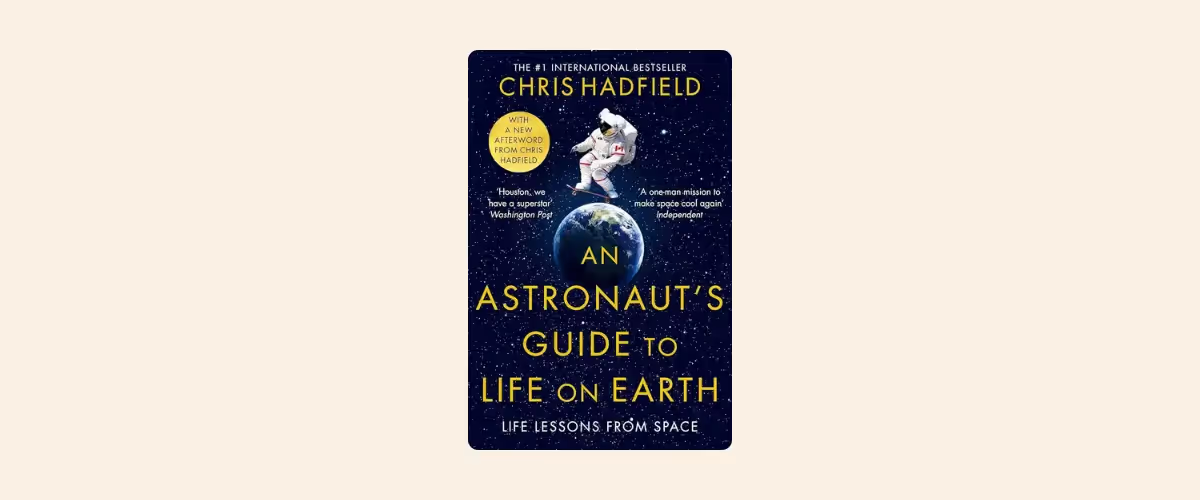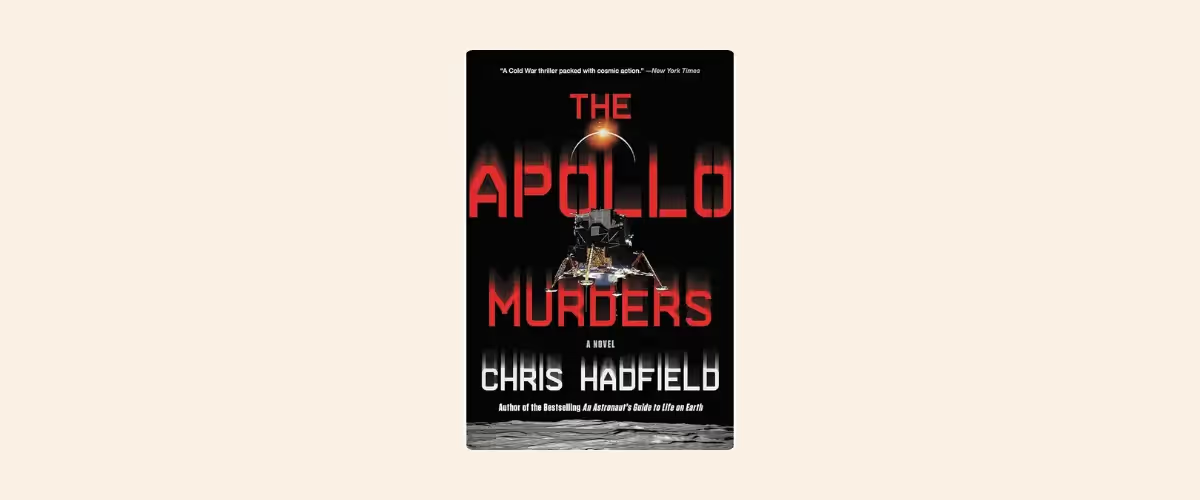Renowned astronaut Colonel Chris Hadfield may be best known for orbiting the planet, but here on Earth, Chris is also a multiple New York Times bestselling author. While his journey as an astronaut might be the one that gets written about the most, we sat down to talk with Chris about his other journey—becoming a writer.
In a live writing class with The Novelry, Chris shared how he got started with writing and his early objectives for writing fiction, as well as the stellar advice he received from an iconic music legend (which you’ll find below). It was such a fantastic conversation with our writers that we wanted to share the five tips we took away from it with you right here on our blog.
.avif)
Writing in varying genres
Chris’s first book, The Darkest Dark, is a children’s book about a young boy who loves rockets and pretending to be an astronaut, but is afraid of the dark—until he watches the groundbreaking moon landing on TV. That’s when he realizes ‘…that space is the darkest dark there is—and the dark is beautiful and exciting, especially when you have big dreams to keep you company.’ Loved by kids the world over, the book drew inspiration from Chris’s own life and encouraged young readers to pursue their dreams.
Exploring the unknown and dreaming big is something all writers can relate to, and something Chris does exceptionally well.
Drawing inspiration from his life, then fictionalizing it like great authors do, he followed up his children’s book with a series of space-themed, action-packed thrillers. He’s also authored a stunning visual essay, You Are Here, and a memoir, An Astronaut’s Guide to Life On Earth, which has already sold in 29 different languages.
But how did Chris start writing?
He shared that, fittingly, his first book began on a flight.
I was on a long airplane flight once, and I do puzzles sometimes just to keep myself sharp. And I had a Sudoku book—I don’t know if anybody in the group here does Sudoku—but I was sitting in between Sudokus and thinking: How? How could I tell this story so that people think it’s a memoir, but in fact it’s a self-improvement book or a book of ideas that people can maybe apply to themselves?
—Chris Hadfield
One thing Chris knew for certain was that the book needed to get people’s attention.
Tip 1: Get people’s attention
I thought, what if I write a book that actually sort of follows the arc of a space flight, from getting ready, launch, right through to landing? And how do you deal with all those different things? And then with flashbacks and interspersed ideas that maybe could help reinforce some of the fundamental ideas that allow you to do things that are right on the extreme edge of what people can do. When I started writing the book in earnest, I’d actually taken photographs of the back of that Sudoku book with a bunch of the ideas that I’d jotted down. I don’t know how everybody else’s brain works, but often, I just sort of latch onto a little vein of an idea and then I write 50 things, everything that pops into my head in that vein, and then I use that as a resource later.
—Chris Hadfield
Even though Chris’s book has the distinction of being one of the 15 bestselling self-improvement books of all time, he told us that his main objective was that the book should be easy, friendly, engaging, and interesting. Judging by the book’s resounding success, we’d say he succeeded!

After writing his memoir, Chris turned his attention to fiction, approaching it with the same dedication and rigor he has approached everything in his life.
He started by asking himself how he could take the experiences and skills acquired from his other careers and build on them to get closer to his dreams.
It’s exactly the same to me as the process by which I’m turning myself into a fiction author.
—Chris Hadfield
For Chris, knowing how to write a book is only part of the process—he also needs to know why he is writing the book.
Tip 2: Ask yourself why you’re writing this book
You know, what’s the point? Is it just for my own benefit? Is it so that my children can see what their father or grandfather was up to, why I am on stage giving a talk? And to me, they’re just a much more extreme version of the other. So initially, I set myself the task of clearly understanding: why am I doing this? Why am I apportioning so much time out of my life to do this thing?
—Chris Hadfield
Ultimately, Chris decided, ‘I’m not writing a book for myself. I am doing this for the audience, for the reader.’
Knowing whether you’re writing for yourself or writing to get published, plus knowing your genre and who your audience is, is something we talk about with all our writers at The Novelry. There’s no right answer—but it’s helpful to have one.
If you’re not sure of the answers, you might like to read some of our other insightful blog articles to help you, such as our guide to book genres, writing coach Tara Conklin’s piece on why you should keep writing even when it feels difficult, and expert advice from coaches Alice Kuipers and Mahsuda Snaith (and the accompanying podcast episode) on ways to overcome any self-sabotage you may be feeling. There are plenty more pieces in our blog to help you clarify your ‘why,’ and we’re always here if you want to explore how The Novelry can help you write your book.
{{blog-banner-4="/blog-banners"}}
Tip 3: Do your research
Chris’s career trajectory is proof that it’s never too late to learn something new!
I do a tremendous amount of research. That’s what I’ve been doing for all of my professions. Understanding what you’re doing has kept me alive as a pilot, fighter pilot, test pilot, and astronaut. And so that rigor of necessity to keep getting to first principles and the actual facts and truth, that’s how I get ready to write a book as well. I start digging heavily into real events and real facts. I write a book every two years, and the first year is research.
—Chris Hadfield
One of the best things about fiction is the opportunity to immerse ourselves in new worlds, try on different points of view, and walk in someone else’s shoes. In fiction, each one of us can go to the moon!

Tip 4: Organize your time and focus
Chris shared that, over the years, he has learned to organize his time and focus on what’s important. He approached his career as a writer just as he did as an astronaut—with the understanding that it was new, that he needed to work with experts to learn the trade, and that it would take education, time, and practice to excel.
I’ve learned how to organize myself and to be time- and energy-efficient in getting stuff done. I’ve had to, in order to do the other professions that I’ve had. What I’ve learned over time is how to do that in the writing process. It’s like compared to the first time I flew an airplane versus now. When I fly an airplane, it’s still an airplane; the task is still the same. But because of my experience and my awareness of what I don’t need to pay attention to and what I do need to focus on, it’s just a much more efficient process now than it used to be.
—Chris Hadfield
Keeping a big ideas document, Chris jots down interesting facts and details about characters as they come to him. He maps out a general chronology of events, where he wants to start, how it could all wrap up, and enough research to help him sort things the whole way through. Then he gets to work writing, aiming for 1,000 words a day.
Tip 5: Don’t judge your creativity
Even inspirations need to be inspired! For Chris, a conversation with legendary singer-songwriter Neil Young led to an important piece of advice he still holds close.
I had a long talk with Neil Young once, and Neil said two things to me that I found really important. Number one was that he never felt like he wrote a song. He just wrote them down, meaning that he didn’t give himself the ostentatious self-posturing of ‘Today I’m gonna write a song.’ Instead, he said, ‘Hey, heart of gold. That’s a heart of gold. That’s a lovely phrase.’ And he picked up his guitar, you know—I wanna live, I want to give, what else rhymes? And he just allowed himself to not have the pressure of structure, and just allowed himself to be creative.
And then the second most important thing he said to me was, ‘Don’t judge your work of creativity until it’s finished. Because if you judge it, if you start judging it after every sentence or after every lyric or after every chord, you’re gonna get partway through and go, “This sucks. This song is terrible. No one’s ever gonna want to hear this song,” and give up.’ Instead, allow yourself the freedom to finish writing it.
—Chris Hadfield
Chris’s parting words to our writers were not to lose heart and to keep at it. As writers, we need to finish what we’ve started and be proud of what we have accomplished—and we couldn’t agree more. It’s an excellent reminder that with hard work, a great attitude, and the willingness to learn new things, we can all reach for the stars.
Live writing classes with living legends
Members of The Novelry enjoy regular workshops, Q&As, and live writing classes with our favorite authors with careers spanning decades and genres, including Tayari Jones, Kristin Hannah, Chris Whitaker, Paula Hawkins, Femi Kayode, Sophie Kinsella, Tess Gerritsen, Samantha Shannon, and so many more. When you join The Novelry, you’ll gain immediate access to our Catch Up TV library of inspiring conversations with bestselling authors, leading literary agents, and top publishing editors to enjoy in your own time and inspire your writing!
Wherever you are on your writing journey, we can offer the complete pathway from coming up with an idea through to ‘The End.’ With personal coaching, live classes, and step-by-step self-paced lessons to inspire you daily, we’ll help you complete your book with our unique one-hour-a-day method. Learn from bestselling authors and publishing editors to live—and love—the writing life. Sign up and start today. The Novelry is the famous fiction writing school that is open to all!
.avif)
.avif)
.avif)
.avif)


.avif)

.webp)
